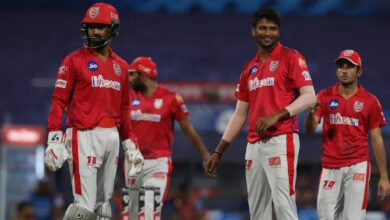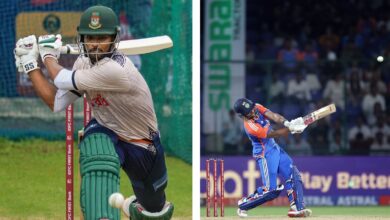Explained: Why Lionel Messi chose to sign for Inter Miami and what’s the role of Apple TV in it?

“I want to get back to enjoy myself, to enjoy my family, my children, the day-to-day,” Lionel Messi said while sending shockwaves across the footballing world revealing he would be leaving his current club Paris St Germain to join Major League Soccer’s Inter Miami.PSG wasn’t giving him the joy he had when he was at Barcelona where he won four UEFA Champions League titles, 10 La Liga titles, seven Copa del Reys, and three Club World Cups.Barcelona did want him back but he didn’t want to go down that road again. He tried, but the deal didn’t appeal to him. “If the Barcelona thing didn’t work out, I wanted to leave Europe, leave the spotlight, and focus more on my family,” he said.
pic.twitter.com/pgu2mE7zlY
— Inter Miami CF (@InterMiamiCF) June 7, 2023
His goals perhaps changed after achieving his lifelong goal of winning the FIFA World Cup in Qatar last year. After years of being under pressure to emulate Diego Maradona and win a World Cup for Argentina, Messi decided that it was time to put himself and his family first.
The spotlight has been beaming down on him ever since he made his senior Barcelona debut at the age of 17. So after achieving all there is to accomplish in the footballing world, it’s understandable for him to choose to go and play in Miami where the pressure to perform at the highest level will not be intense.
There was Saudi Arabia too, which promised him hundreds of millions if he chose to play there. Messi says he wanted his family to be able to enjoy themselves.
And they can do that in Miami. Messi already owns luxury real estate in South Florida and likes to spend holidays there. In Miami, Messi said in an interview, he and his family would have a different lifestyle.
🚨 Lionel MESSI confirms his next team will be @InterMiamiCF! 🚨
🎥: SPORT pic.twitter.com/caMtXP2OaI
— beIN SPORTS USA (@beINSPORTSUSA) June 7, 2023
“There were two years when I wasn’t happy. I didn’t enjoy myself and that affected my family life. I missed a lot of my kid’s school lives. In Barcelona I used to pick them up, here I did it a lot less. I did a lot less with them. That was part of the decision as well, to find myself with my family, with my sons, and to enjoy the day-to-day. I’ve had the luck of achieving everything in soccer and now things go a little further than sport, which I’m still interested in a lot, but even more the family aspect,” he said.
The only time he seems to have enjoyed in the French capital was when he just won the World Cup.
“I had that month which was spectacular for me because I won the World Cup, but apart from that it was a difficult period for me.”
The lower-intensity environment of the MLS could even prolong his international career. In more than 17 years of representing Argentina on the international stage, he has scored 102 goals against 38 different national team opponents — 16 of those goals coming on US soil.
Messi wants to continue as Albiceleste’s captain when they try to defend the Copa America and the World Cup in 2024 and 2026 respectively. Both tournaments will be hosted predominantly in the United States.
Signing the dotted line
It wasn’t easy for Inter Miami to sign Messi. They had to fight off the financial power of Saudi Arabia and then Messi’s first love: Barcelona. It took months of negotiations with MLS, the Miami ownership, Adidas, and even Apple getting involved in a creative pitch to bring Messi to Miami’s pitch.
Apple just signed a 10-year broadcast agreement with MLS. Every one of the league’s matches is broadcast on MLS Season Pass, a streaming service contained within Apple TV+. The foundation of MLS’s $2.5 billion agreement with Apple rests on subscription sales, a portion of which could go to Messi as part of his deal, according to The Athletic.
Apple also announced last week that it will show a still-untitled four-part documentary series “featuring exclusive behind-the-scenes access to Messi”.
The 35-year-old’s deal with Apple could potentially see him become the face of the MLS during the World Cup. Added to Adidas’s long-standing relationship with Messi since 2006 and their willingness to share profits, his face in the MLS could spell a windfall.
Economic & Social media impact
If the numbers PSG reported during Messi’s time at PSG are any indication, Inter Miami will become among the most popular brands in America. According to a report from Marca, PSG generated €700million in revenue over the course of one year after his arrival.
The report cites an investigation Argentine outlet El Economa, which reported that since Messi joined the club, PSG had added 10 new sponsorship deals ranging from €3m to €8m each. Image rights and match day sales also skyrocketed, as did the demand for Messi’s No. 30 PSG shirt.
On social media, PSG saw its following increase astronomically. PSG gained 5.6 million followers the week after announcing Messi’s signing and has since added 15 million new followers across its social media platforms. Messi’s departure had its own effect on the brand: PSG lost 2 million followers on Instagram in the weeks after it became clear he wouldn’t return.
When Pele signed for the MLS in 1975, he managed to influence a generation of American footballers. David Beckham came in 2007 and briefly took it mainstream and made MLS a lot of money.
Messi could make it explode.







